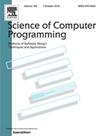Comparing differentiable logics for learning with logical constraints
IF 1.4
4区 计算机科学
Q3 COMPUTER SCIENCE, SOFTWARE ENGINEERING
引用次数: 0
Abstract
Extensive research on formal verification of machine learning systems indicates that learning from data alone often fails to capture underlying background knowledge, such as specifications implicitly available in the data. Various neural network verifiers have been developed to ensure that a machine-learnt model satisfies correctness and safety properties; however, they typically assume a trained network with fixed weights. A promising approach for creating machine learning models that inherently satisfy constraints after training is to encode background knowledge as explicit logical constraints that guide the learning process via so-called differentiable logics. In this paper, we experimentally compare and evaluate various logics from the literature, present our findings, and highlight open problems for future work. We evaluate differentiable logics with respect to their suitability in training, and use a neural network verifier to check their ability to establish formal guarantees. The complete source code for our experiments is available as an easy-to-use framework for training with differentiable logics at https://github.com/tflinkow/comparing-differentiable-logics.
比较具有逻辑约束的可微逻辑学习
对机器学习系统形式化验证的广泛研究表明,仅从数据中学习往往无法捕获潜在的背景知识,例如数据中隐含的规范。已经开发了各种神经网络验证器,以确保机器学习模型满足正确性和安全性;然而,它们通常假设一个具有固定权重的训练过的网络。创建训练后内在满足约束的机器学习模型的一个有前途的方法是将背景知识编码为通过所谓的可微逻辑指导学习过程的显式逻辑约束。在本文中,我们通过实验比较和评估了文献中的各种逻辑,展示了我们的发现,并强调了未来工作的开放性问题。我们评估了可微逻辑在训练中的适用性,并使用神经网络验证器来检查它们建立形式保证的能力。我们实验的完整源代码是一个易于使用的框架,可以在https://github.com/tflinkow/comparing-differentiable-logics上使用可微逻辑进行训练。
本文章由计算机程序翻译,如有差异,请以英文原文为准。
求助全文
约1分钟内获得全文
求助全文
来源期刊

Science of Computer Programming
工程技术-计算机:软件工程
CiteScore
3.80
自引率
0.00%
发文量
76
审稿时长
67 days
期刊介绍:
Science of Computer Programming is dedicated to the distribution of research results in the areas of software systems development, use and maintenance, including the software aspects of hardware design.
The journal has a wide scope ranging from the many facets of methodological foundations to the details of technical issues andthe aspects of industrial practice.
The subjects of interest to SCP cover the entire spectrum of methods for the entire life cycle of software systems, including
• Requirements, specification, design, validation, verification, coding, testing, maintenance, metrics and renovation of software;
• Design, implementation and evaluation of programming languages;
• Programming environments, development tools, visualisation and animation;
• Management of the development process;
• Human factors in software, software for social interaction, software for social computing;
• Cyber physical systems, and software for the interaction between the physical and the machine;
• Software aspects of infrastructure services, system administration, and network management.
 求助内容:
求助内容: 应助结果提醒方式:
应助结果提醒方式:


